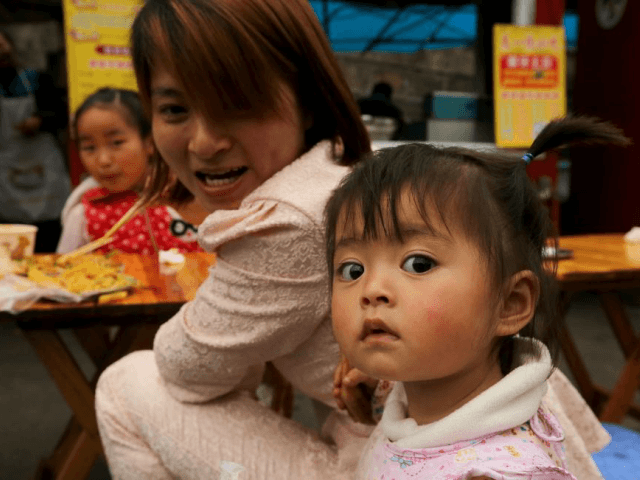China’s state-run Global Times newspaper reported on Tuesday that the government will shut down all its family planning administrative departments to spend more money on caring for the elderly, relegating family planning control to a new “Department of Demographic Surveillance and Family Development.”
For decades, China imposed a “one-child policy” on its citizens, forcing women to abort their children if they already had one and triggering the widespread practice of sex-selective abortion, leading to a significant deficit in the number of women of child-bearing age in the current population. Communist Party leader Xi Jinping moved to reverse the trend by replacing the old law with a “two-child policy” and a campaign encouraging parents to have a second child. The new policy has failed to entice Chinese families to grow, however, and the number of births dropped nationally after the rule change in 2016, with signs it will continue to do so throughout 2018.
According to the Global Times, Beijing decided to get rid of three departments tasked with ensuring that Chinese families did not have unauthorized babies, a move that government-approved “experts” said was necessary to “further boost fertility rate.” The departments that are no longer in existence reportedly dealt with “grass-roots” activity, meaning the thorough monitoring of couples to ensure that they terminated any children the government did not approve of.
One of the experts speaking to the Times, Lu Jiehua, suggested that the move is the latest such change meant to prepare for the lifting of restrictions on family sizes completely.
“The revamp is a sign that China will end further restrictions on childbirth and will fully relax the family planning policy,” the sociologist claimed. Another expert predicted that the government would no longer force families to abort their children starting in 2019, though Lu suggested that this was impossible because the forced abortion policy was too popular. Those who support it fear that, without giving wealthier couples rewards for having children, lifting the two-child policy will result in only poorer families with less access to contraception having more children and demanding a larger social safety net.
Beijing appears to be torn on whether the solution to boost fertility rates is to incentivize families to have more children or to punish those who do not do so. One proposal suggested to incentivizing couples last month was to establish a new tax on couples under 40 who do not have children and using that money to pay parents to raise their children. The policy would achieve both the punishment and incentive goals, but potentially trigger a public outcry. Even the mention of the potential policy in state-approved media prompted a wave of criticism on Chinese social media, which typically heavily censors any critiques of the communist regime.
Different Chinese provinces are explorings new ways of making people reproduce. In July, the government of Liaoning province announced it would “explore enacting policies to reward families who choose to have a second child to alleviate the burden in bearing and raising children.” This plan would pay families to have the children but not necessarily punish childless or only child families with a tax.
In another province, Jianxi, officials announced they would begin limiting access to abortions, not only to ensure more births, but to prevent women from killing their daughters in an attempt to get pregnant with a son and have only one child. Sex-selective abortions are extremely common in China and have not significantly diminished in popularity after the implementation of the two-child policy. The result is a population with nearly 34 million fewer women than men, a problem that lifting birth limits does not solve. If there are no women to have children, the fact that the government will not force the women to abort their children will not change the number of children born.

COMMENTS
Please let us know if you're having issues with commenting.